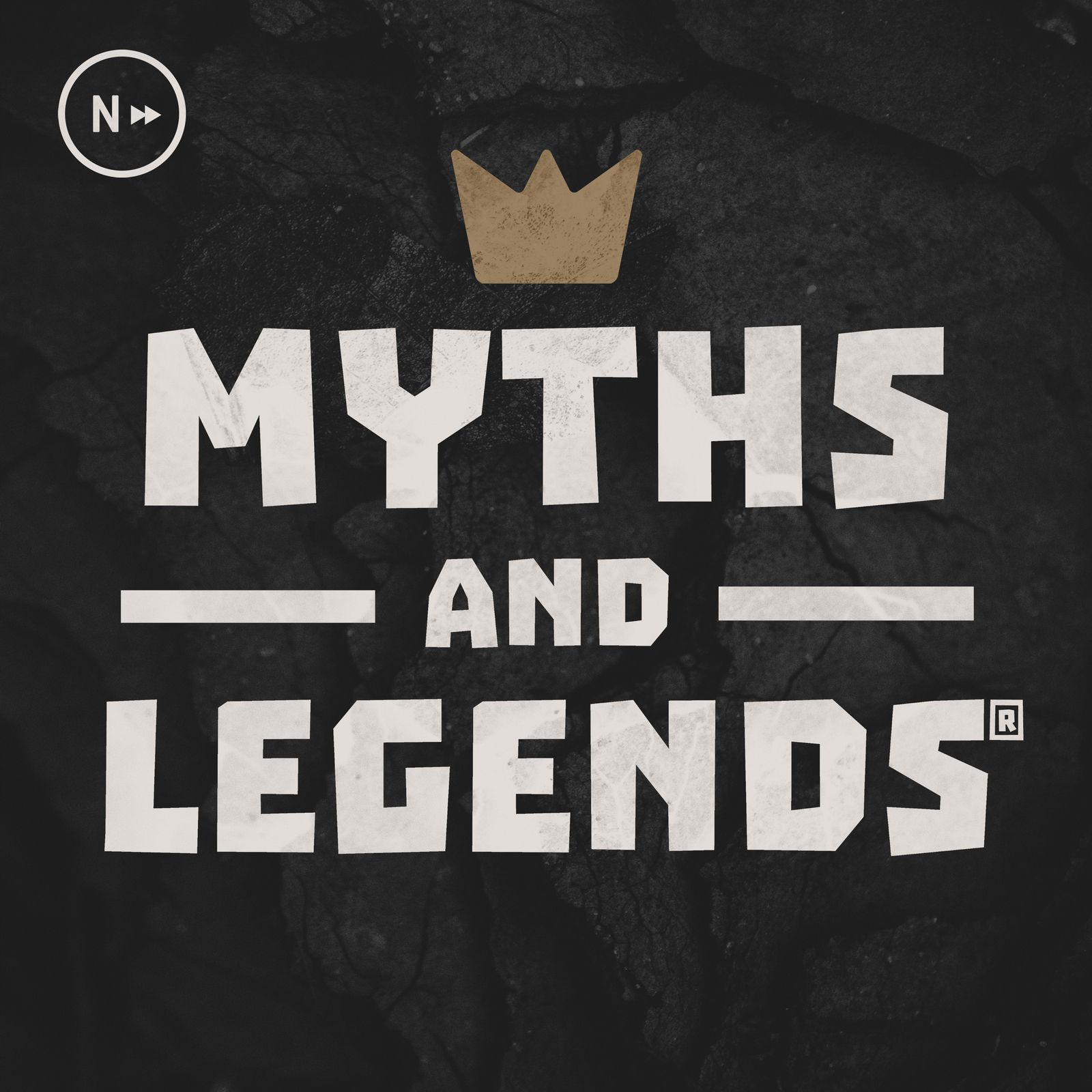
Myth Monsters
A bite sized look into the monsters of global folklore, cryptozoology and mythology with your host, Erin. Jump in and learn about your favourite monsters from Gorgons to Kelpies, to Wendigos to Bigfoot. Stay spooky every Thursday with a new episode with a new monster from another culture. Get in touch on Twitter at @mythmonsterspod
Myth Monsters
Yuki-onna
For this week's episode, we're heading to the coldest regions of Japan for the inspiration behind the Pokemon, Froslass - the Yuki-onna! Who would she target with her icy breath? How could you get her to marry you instead of murder you? Find out this week!
You can find us on:
Social media:
INTRO:
Hello and welcome to Myth Monsters, my name is Erin and I’ll be your host for these little snack bite size podcasts on folklore and mythical monsters from around the world.
These podcasts focus on the actual cryptids, folklore and mythic monsters from global mythology, rather than focusing on full stories of heroes and their big adventures.
I’ll also be dropping in some references that they have to recent culture and where you can see these represented in modern day content so you can learn more, and get as obsessed as I am about these absolute legends of the mythological world.
We’re at the last few weeks of summer and I’m thrilled, it’s been a long one and I hated it. Also the World of Warcraft expansion comes out this evening as of the publish date of this episode, and so I will be lost to the battle for Azeroth for the next few weeks - so it’s nice to not have to bake in my study whilst I act like a massive sweat lord in game.
DESCRIPTION:
But this week, we’re definitely not sweating with this monster - in fact, probably the opposite where we’re turning into icicles if we touch her - yes, we’re heading to Japan this week to look at the winter spirit, the Yuki-onna.
The Yuki-onna are described as a yokai, or spirit, in Japanese culture, who are the female personification of winter storms and hyperthermia, the condition of basically, freezing to death. They are typically beautiful women, with long white or dark hair, blue lips, wearing a white frost-covered kimono left wandering alone in the snow. They, like many other yokai are mentioned to have either no feet, or make no footprints, as they will float over the surfaces.
They’re usually described as being young and having skin so pale that it’s almost translucent, and whilst they are most typically seen in their kimonos, they can also be found more scantily clad and sometimes even completely naked. Interestingly, white kimonos are considered as burial kimonos and to see a woman in a white kimono was uncommon and taboo in Japanese culture.
So what makes these monsters possibly the deadliest monster of the Japanese winter? Well, as I said, they’re the personification of winter storms and they have power over any kind of snowy situation. They can turn into blizzards, snow storms, avalanches and icicles, which is how they get around.
It’s said that the Yuki-onna can freeze anyone with a glance and if you freeze around her, she will suck away your life force with her wintery breath. You also can’t ignore her, otherwise she will push you off a cliff or bury you within a snowdrift.
In some stories, Yuki-onna can be intentionally vicious and brings in snowstorms to trap travellers and uses her icy breath to leave them as frost-coated corpses or leads them into danger so they die of exposure. Sometimes they can also be found with children, and when the person goes to take the child from her, they are frozen in place - this works especially well on parents searching for lost children. She can also just walk into your home, blowing in the door with a gust of wind to kill residents in their sleep from the cold - although this is debated as to whether you have to invite her in first. They are sometimes known to be merciful though, letting victims go if they showed her kindness or love.
There are a few differing accounts as to their preferred victims, sometimes with them being children who stay outside in the cold too long, where the Yuki-onna steals them away and eats their livers. But most commonly, it is usually men who venture into the snowy wilderness.
Yuki-onna are always described as women, and sometimes even as Succubus - the temptation demons from religious stories as whilst they are yokai, they are sometimes known to seduce men, marry and have children with them. They can also drain their lifeforce through sex or even something as small as a kiss. They can sometimes also be found with snow children when discovered, which are basically mini-Yuki-onna and are also usually female.
They also had the power to turn into normal women, but the only way you could tell them apart is by their unnatural white hair, which is very uncommon in Japan, as well as their seemingly never ending beauty - they would be as magnificent as the day you met them forever, even as you age. They were perfectly capable of living a completely normal life away from their freezing cold home.
Speaking of these mountainous regions, where are we talking about - we’re talking about the Northern prefecture of Japan, the Tohoku region. This region of Japan gets more snowfall than anywhere else in the country and has 28 mountains within its wide range. The weather up in these mountains is horrendous and immensely cold going down to as low as -20 in the winter months. The Yuki-onna lives within these mountain ranges, hiding out and waiting for another stupid adventurer to come her way.
We believe that the Yuki-onna is formed by the usual means, a woman being left to die in the snow. They can generally be vengeful of the people that left them there, or they can just haunt the area. Although another telling is that they ARE the snow, embodying the Japanese belief in the elements being alive and the weather, sun and moon can activate a kind of consciousness, which explains some of their oddest yokai that we’ll cover in other episodes.
Whilst we think that they eat children’s livers in some versions, we’re not actually sure if they eat at all. We also do know that they can reproduce with normal humans and it’s not known whether there’s a way to kill them. They do tend to go away in the warmer months, so at least then you can be free to explore instead.
ORIGIN:
Now onto etymology, Yuki-onna is of course, a Japanese word which is split into two word meanings. Yuki means snow and onna means woman, so literally it means snow woman. I’m sorry to say that it’s not particularly interesting this week I’m afraid, but I do like the literal-ness of Japanese and actually how easy it is to pronounce.
Their history is interesting, but I’m excited to tell you some Yuki-onna stories. We know that the Yuki-onna goes back to at least 1336 AD, which actually isn’t that old for a Japanese monster, but we do believe that this was most likely around beforehand. This is because the first mention of these is within a poem by the poet Sogi called Sōgi's Tales from Various Provinces from 1685 where he talks about the established character of a Yuki-onna whilst staying in the North-West of Japan. He gave us the description of the Yuki-onna for the first time and this was followed by differing descriptions and stories about this monster from all the different regions of Japan, so I’ll tell you some.
In one telling, a Yuki-onna would come visit an old couple on a snowy night to warm herself by the irori, which is a fire pit in the floor. Much later in the night, the Yuki-onna would leave and the old man would attempt to stop her, when he noticed that she was absolutely freezing and then before his eyes, she turned into a whirl of snow that left through the chimney.
Another story tells of a blizzard and the Yuki-onna standing in it, hugging a child. She would ask people passing by to hug the child as well, but as they did, the child would become heavier and heavier until the person would become covered with snow and freeze to death. If you refused to hug it, you would be shoved down into a snowy valley - how nice. There was a version of this story that a warrior hugged the child with a blade in his mouth that took the brunt of the cold, and once the hug was over, the Yuki-onna gave him treasures and made him physically very strong as a reward.
My favourite story was of the woodcutter and the Yuki-onna, written by Lafcadio Hearn, where there were two woodcutters - young Minokichi and old Mosaku. One winter’s night, they weren’t able to get home due to a snowstorm and they stayed in a hut. Minokichi woke up to find a beautiful, white clothed woman breathing over Mosaku, who was frozen and dead. She approached the man, but hesitated at how beautiful he was then said ‘I will not kill you, because you are young and beautiful. You must not tell anyone about this, and if you do, I will kill you’.
Many years later, Minokichi met a beautiful woman called O-Yuki - which if you remember the etymology for tells you enough, and he eventually marries and has 10 children with. She never ages and they live happily for years, however, one night O-Yuki comes in wearing white and Minokichi remarks that she reminds him of a mysterious woman he met. O-Yuki stands up and screams that she was the woman and he promised not to tell anyone about her. However, she couldn’t kill him because of her children with him, and told him to look after them before she melted into a puddle on the floor. Definitely a moral story that you shouldn’t make promises you can’t keep too, which I really like about this one.
My last cool story is of an assassin who wanted to kill a Shogun, a military rank in Japanese history, but had to get his maid to leave the house first. He told her that the Shogun is planning to start a war and that she has to tell others in the household to prepare to leave and that his brother was waiting to escort her away from the house for safety. However, when the maid goes outside, she is locked outside and no one comes for her, so she freezes to death. She is transformed into a Yuki-Onna and seeks revenge against the man who sent her out.
Alot of Yuki-onna stories are not only based on yes, it’s cold outside and you might die - but other morals too, such as trying to change social order like this last story, or even getting with a spirit or supernatural being, which usually came from mountain people, who believed that those who break the mountain taboos would be killed by mountain spirits.
Older stories about the Yuki-onna are usually just really sad. It’s usually from people who, like childless old couples or single men in mountain villages, would hear the sound of a blizzard knocking on their shutter door and fantasise that the thing that they longed for has come, such as a child or a wife. It is said that after that, they would live in happiness with what they longed for in a fantasy as fleeting as snow. In Japanese culture too, winter is also the season when the Gods would come to visit the Earth, and if you did not pay respects, terrible things were destined to happen - even if that comes in the form of a snowy maiden trying to marry you.
I think there are two things to take away from this monster - one is that the weather should never be underestimated, especially in the wilderness and that the winter is dangerous but beautiful and I think that’s quite nice, although slightly foreboding.
In reality to debunk this one, it sounds like she is a personification of the threats of the winter. A boogeyman to anyone thinking to tread the dangerous walk up the mountains, although one that might even turn out okay if you’re her type.
We do have a similar monster in European folklore with Jack Frost, whilst he is the personification of winter and a spirit who can cause trouble with his icy powers - he definitely didn’t try to bury people in snow til they freeze to death or trick them into marrying them to only reveal themselves years later.
CULTURAL SIGNIFICANCE:
Now onto modern media, we actually have a load for the Yuki-onna specifically, mainly as they’re heavily referenced in video games and anime.
For art, have a look at the Yuki-onna by Sawaki Suushi, Yuki-onna illustration from Sogi Shokoku Monogatari and Yuki-onna by Toriyama Sekien, Yuki-onna from Bakemono no e from 1700. Otherwise, check out independent art this week for some really cool icy ladies.
In movies, we have; Akira Kurosawa's Dreams, The Snow Woman, Tales from the Darkside: The Movie & Kwaidan.
For TV, we have; MythQuest, Ultraman, Return of Ultraman, Super Sentai, Akumaizer 3, Bleach, Hell Teacher Nube, Goblin Slayer, Doraemon, Inuyasha, Monster Musume, Rosario + Vampire, Yu-Gi-Oh!, Missions of Love, Yaiba, The Littl’ Bits, Yatterman, Interviews with Monster Girls, Franken Fran, The Kindaichi Case Files, Case Closed, Ayakashi Triangle, The Ice Guy and His Cool Female Colleague & Urusei Yatsura.
In video games, we have ones such as; Yuki-Onna, Cassette Beasts, Pokemon, Shin Megami Tensei, Heroes of Might and Magic, Final Fantasy, Dragon Quest 6, Muramasa: The Demon Blade, Nioh, Yo-kai Watch, Touhou Project, Yokai Hunter Shintaro, Shinobi, Flower Girl Knight, Ninja: Shadow of Darkness, Ayakashi: Romance Reborn, Tsukino Paradise, Yodanji & Senran Kagura.
My book recommendation this week is for The Book of Yokai by Michael Dylan Foster, it’s a holy book of all creatures Japanese, as well as the Yokai Attack!: The Japanese Monster Survival Guide & Yurei Attack!: The Japanese Ghost Survival Guide by Hiroko Yoda, which are two of my favourite Japanese monster books and she is truly a fantastic and fun author.
DO I THINK THEY EXISTED?
Now it’s time for, do I think they existed?
I’m going to say no on this one, because I think this one is pretty well-explained by the whole ‘I don’t want to die in a cold mountain-scape’ thing. If it gives people some comfort to believe that a scary woman blowing on them kills them rather than just the elements - then I guess that’s what it is.
But for me, it seems a bit far fetched - but that’s not to say that I don’t think this one is really cool. I love the idea of these beautiful snow maidens trying to convince men to be with them but stealing their kids or their lives directly - the idea of a kimono-wearing, traditional woman doing this is pretty cool.
I like the idea of snow spirits quite a lot, the personification of the winter and the harsh reality of this type of weather in these rural and isolated places, where rumours of monsters causing these natural but horrible deaths are as believed as the mountains themselves. It’s a lovely balanced monster of how beautiful the winter is, but also how deadly it is to be out in it.
But what do you think? Did the Yuki-onna freeze up families in Japan? Let me know on Twitter!
OUTRO:
Literally a perfect monster to bring us into autumn with this horrendous heat - I knew nothing about this monster so I hope you enjoyed learning about her as much as I did, especially with the presence this has in Japanese folklore and within the media too.
Next week, we’re taking a much needed break from serious myth monsters and heading on over to technically, nowhere - but fictionally, we’re taking the Hobbits to Isengard! Yes, I’m doing a Hobbit episode even though we know they’re fictional - SUE ME. I’M EXCITED AND I LOVE LORD OF THE RINGS OKAY?!
For now, thank you so much for listening, it’s been an absolute pleasure. If you enjoyed this podcast, please give it a rating on the service you’re listening on - I’ve got the twitter for any questions, or suggestions on what monsters to cover next and I’d love to hear from you. The social media handles for Tiktok, Youtube, Threads and Instagram are mythmonsterspodcast, and twitter is mythmonsterspod. But all of our content can be found at mythmonsters.co.uk, including some very cool merchandise - you can also find us on Goodpods, Buymeacoffee and Patreon if you want to help me fund the podcast too.
Come join the fun though and share this with your pals, they might love me as much as you do.
But for now, stay spooky and I’ll see you later babes.
Podcasts we love
Check out these other fine podcasts recommended by us, not an algorithm.

FolkLands
Tim Downie, Justin Chubb
Chatsunami
Satsunami
The Howdy Beans Podcast!
Luke The Elder Bean!
My Brother, My Brother And Me
The McElroys
Myths and Legends
Jason Weiser, Carissa Weiser, Nextpod
Lore
Aaron Mahnke
Exploration: Dreamland
Exploration: Dreamland
The Neatcast
Jeremy, Zack, Mike
Effin' Cultured
Bobby, Griff, and The Rik
